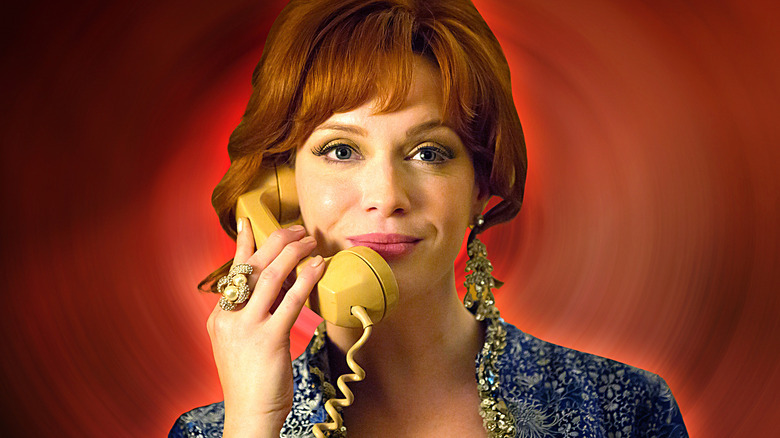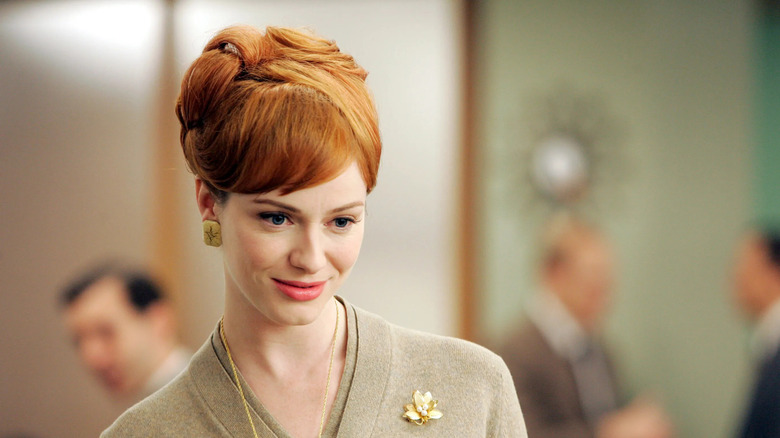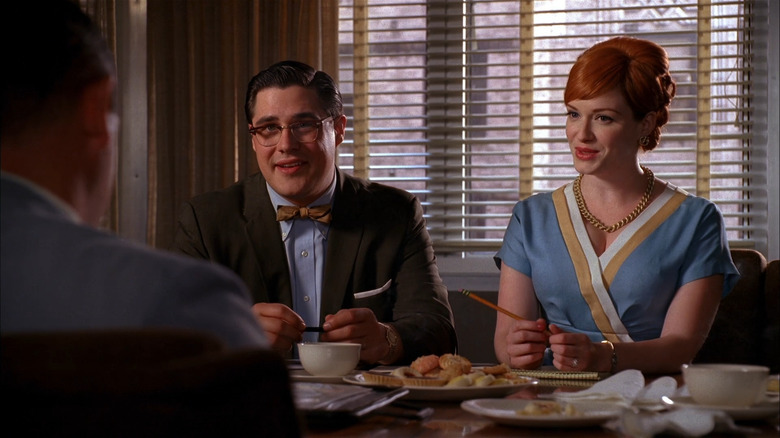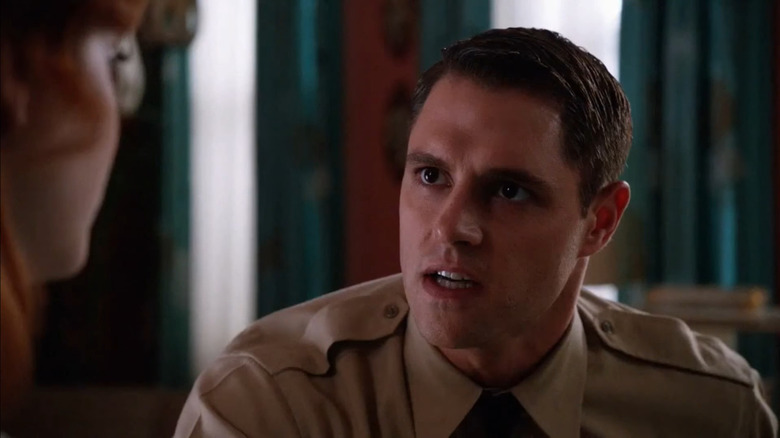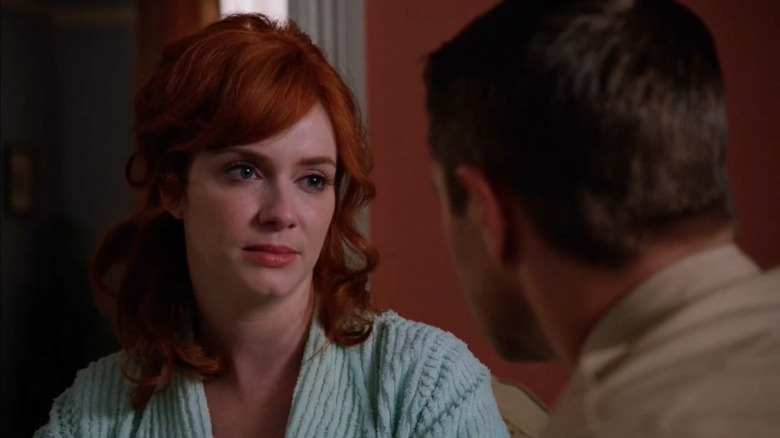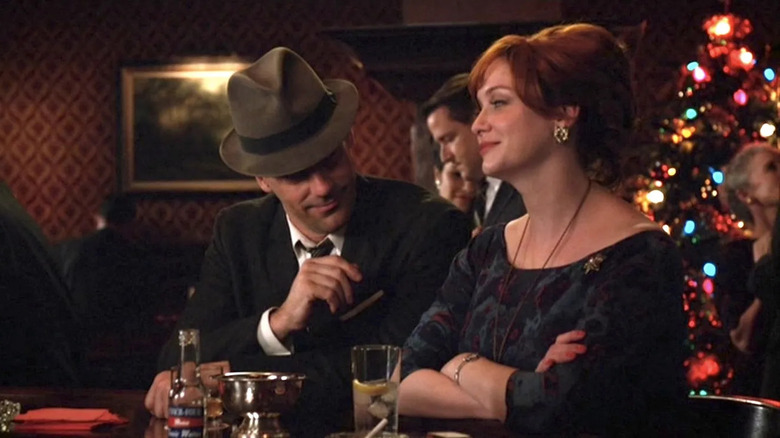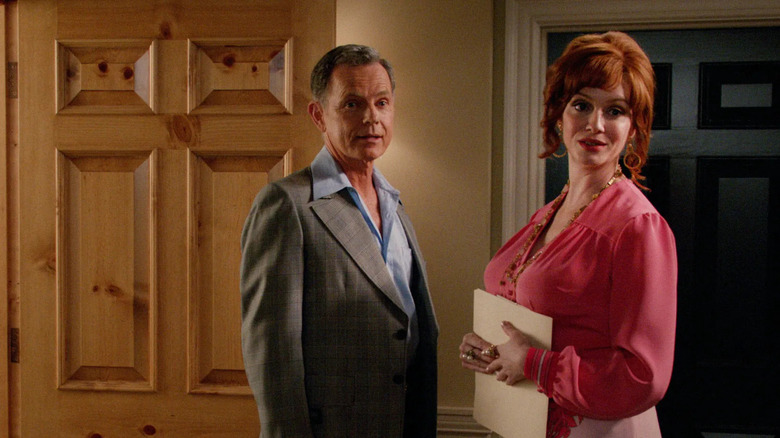Mad Men's Showrunner Had A Completely Different Plan For Christina Hendricks' Joan
When it comes to the feminist themes of "Mad Men," it's typically Peggy (Elisabeth Moss) at the front of the conversation. She's on a clear upward journey from the moment she shows up in the pilot, and spends the show slowly but surely rising through the ranks of a male-dominated corporate environment. Then there's Betty (January Jones) as Peggy's polar opposite, a woman who spends the series trapped in an unfulfilling housewife role, even though she's not stupid and she speaks Italian; she totally could've enjoyed that career in psychology if she'd been born a little later.
In the middle is Joan. She's introduced as an extension of the mean girl trope, and characterized as sort of vain and shallow. She casually espouses all the ideals about gender roles that the show itself clearly wants to criticize. She comes from a time where looks really are almost all that matters for a woman, where the main goal for a secretary in a workplace like Sterling Cooper's is to marry one of the ad men and settle down upstate. She's still a fun character (she's played by Christina Hendrick after all) but it takes a while before the series gives her the same level of compelling material that characters like Pete and Peggy always enjoyed.
As it turns out, the reason for this is because showrunner Matthew Weiner didn't originally have any big plans for Joan. In the early drafts, she was a plot device to introduce Peggy to the office, not much more. "I thought Joan would be more like an Eve Arden type, that she would just be Peggy's friend," Weiner explained in a 2012 interview. "Joan would be kind of the courtesan who is sort of inducting Peggy into this world in the pilot, and then maybe we'd see her a few other times."
Mad Men season 1 Joan: Still just having fun
As "Mad Men" fans know, Joan was much more than a courtesan. She not only stuck around as a major character after the pilot, but quickly established herself as an irreplaceable part of the team. As Weiner explained:
"Christina brought all of this power, sexuality and confidence, and I recognized this dynamic between her and Peggy. I thought, this is going to be interesting to see how this office works ... On one hand, I was telling a kind of unconscious feminist story with Peggy ... On the other, there was a story in Joan of someone who was ambitious in a different way with different goals."
Joan was someone who wanted what women of her time were supposed to want: a nice, rich husband who could provide for her so she can focus on being a wife and mother. But even as early as season 1, there was a bit of a contradiction there in Joan's character: Joan was already around 30 at this point, an age where most woman at the time would've settled down. Peggy, for instance, is only 26 in season 4's "The Suitcase," when Trudy (Alison Brie) feels the need to reassure her that it's not too late to find a good man.
Already the hints are there that, as much as Joan talks about how a traditional housewife role is her main ambition, she clearly enjoys being the head secretary at Sterling Cooper. She might not have the hard power (or the high wages) of someone like Roger or Don, but she does have a ton of influence over the office. In season 4 she might not be able to outright fire Joey (Matt Long), a misogynistic copywriter who treats her like trash, but it's clear she knows how to sabotage him out of the office. Even if Peggy hadn't fired Joey, Joan likely would've sent him packing through her influence on Roger alone.
Most of all, Joan is good at her job, and we see examples of this constantly. From her being the first to step in when a coworker gets their foot mangled by a lawnmower, to her figuring out how to hide Mrs. Blankenship's surprise dead body, there's never a moment where Joan doesn't casually reveal her total competence. Even when she's working elsewhere, like briefly in season 3 at the department store, she's undeniably great at what she does. To keep her stuck at home would be a tragedy, but it seemingly takes a while for Joan to realize this.
Mad Men season 2: the sparks of change
The first Joan moment to truly tug at my heartstrings, the one that made me realize I loved this character just as much as Peggy or Don, came in season 2's "A Night to Remember." It's the episode where Joan helps out Harry (Rich Sommar) in the firm's newly-established TV department. As always, Joan proves herself to be good at the job, but this time she turns out to love it. Joan's never seemed as happy or as endearing as when she's talking about TV advertising here, which immediately raises the idea in most viewers minds: Harry is looking for someone to permanently do this job, and Joan's already proven herself a whiz at it, so why not give the job to her?
No such luck. The gig is unceremoniously given over to some guy we've never met, with neither Harry nor anyone else at the firm even considering the possibility of asking Joan if she wants it. Harry tasks Joan with helping the new guy get the hang of the job; he tells the new hire that Joan "knows everything about this," and the new guy jokes, "That makes one of us." It's meant to be a disarming, self-deprecating joke, but all it does is rub extra salt in the wound. Not only has Joan been denied the job she excels at, but her replacement is openly admitting to knowing less than her and being less qualified for it.
Although Harry would gradually reveal himself to be a total sleazeball, descending into full "nobody likes him" territory by season 5, the scene is not really an example of him being a jerk. Joan is not considered for the TV job because secretaries are pretty much never considered for these jobs. Even Peggy initially only got her copywriting promotion because Don wanted to make Pete Campbell mad.
Joan is also not considered for the job because she herself never asks for it. She's always understood how the men at the company view her, and the limitations of what she'd be allowed to do. Her disappointment in this scene seems like a surprise even to herself, like she's only beginning to realize that another, higher-up job is what she wants.
Greg was the perfect match for Joan... on paper
In a post-season 2 interview, Matthew Weiner summed up what happened to Joan with the TV job succinctly:
"Joan is a working woman, and she wasn't even considered for that standards and practices job. They didn't even think about it. It wasn't malicious; they just never thought about it. My advertising consultant said, 'The biggest tragedy of this thing, besides that we love Joan and want her to be recognized, is that this is the first successful business relationship that we've seen at Sterling Cooper, and it's thrown away.' They really worked well together."
Making things worse for Joan is the way this treatment at work coincides with her engagement to Greg (Sam Page), a man who tragically never dies when he ships out to Vietnam. Greg appears to fit perfectly with what Joan is supposed to want in a husband, but quickly the cracks start showing; not only does his promising career as a surgeon not pan out, but he's insecure, selfish, and as one of the darkest scenes in the whole series reveals, a rapist. Still, Joan sticks with him, leading to what Weiner called one of the saddest moments in the series for him.
"All I think about is that scene when she tells Peggy she's getting married at Christmas, which is very painful, which shows she's still devoted to this fiancé despite him raping her," Weiner said. "Nine years, she's been there nine years and she's back on Don's desk and Peggy is getting her name on the door. That is a reality that she did not expect."
Joan in Mad Men seasons 3-4: trapped in limbo
The middle seasons of "Mad Men" were a rough time for Joan fans, as she seemed to be pulled further and further away from the office. She briefly seems to have left the show entirely in season 3, but thankfully returns to work after Greg goes off to Vietnam. Greg's departure is good news for the audience — no more Greg! — but it's not what Joan wants to hear. She's in her mid-thirties by this point; she knows her window to have kids is closing, and with Greg gone for months on end she has no choice but to wait around for him while the clock is ticking.
Things get even messier in season 4 when Joan gets pregnant with Roger's child. She chooses to keep it and pass it off as Greg's, hoping Greg doesn't do the math and realize that the timing of her due date doesn't quite match up to when he left. It puts her in a scary position, as we know Greg can be violent and it feels like he could find out at any moment. Thankfully(?) Greg keeps revealing himself to be more and more of a terrible guy; he doesn't care enough about his supposed son to look closely at the situation.
What make this section of the show so fascinating for Joan, especially on rewatch, is how much of it's a blessing in disguise. Seeing how much Joan flourishes in the later seasons, the worst thing that could've happened to her here is if Greg had been a 10% better husband. If he'd shown he cared even a little bit, if he hadn't been in such a rush to go back to Vietnam a second time, Joan probably would've stayed with him for propriety's sake. Instead he's just horrible enough to give Joan the push she needs. She kicks him out of the apartment at the beginning of season 5 and never looks back. It's one of the show's most satisfying scenes, right up there with Joan smashing a vase on Greg's head in season 3.
Mad Men season 5-7a Joan: Finally rising the corporate ladder
There's a lot to love about Joan in this period. She develops a surprising, tender friendship with Lane Pryce (Jared Harris), and her relationship with Peggy has now firmly gone from frenemies to just regular old friends. This is also the season that gives us the "Surprise, there's an airplane here to see you!" line, and that electric scene of Joan and Don hanging out at a bar together. Joan and Don's interactions throughout the series are few and far between, but the writers really made the most of them there.
But most notably, this is the season where Joan goes from head secretary to a partner at the firm, with a 5% stake. She get this position after Herb Rennet, the creepy head of Jaguar, makes sleeping with her his condition for working with the firm. It's even tougher for Joan because all the other partners know about the deal; it's not just that she's basically being pimped out by Pete Campbell, but it's happening to her in a quasi-public way. Jaguar's account would be huge for the firm, and Joan makes the difficult choice to go along with the deal.
When asked about Joan's decision at the time, Weiner explained:
"Honestly, a lot of what happens in the show is derived from what I would call my own personal social-history project — that I'm lucky enough to have people tell me about their lives. This scenario was something that came up so many times that I kept thinking, 'Well, we're going to have to do it eventually.' So while I love that people think that Joan wouldn't do that, all I can tell you is it really happened. A lot. And it was as simple as, 'He really likes you!' The part that's probably false is the partnership part. Most of them just got a car or cash or an apartment, sometimes a promotion."
It's a thankfully nonjudgmental approach to Joan's choice, one that reflects the mostly kind responses of Joan's new partners. Neither Pete nor Roger shame her for sleeping with Herb; her only real critics are Harry (who no one likes) and Don (to a more subtle extent). Most of them recognize her decision as the strategic move it was. Joan has not only gotten herself a lifetime of financial security, but has finally gotten herself a foot in the door to real power.
Harry later trashes Joan to her face about not getting her partnership on merit, but us Joan stans remember that when she proved her merit back in season 2, Harry didn't even notice or appreciate it. Unfortunately, for a woman with Joan's appearance in the sixties, her options were limited, and no one should blame her for playing the hand she was dealt. Weiner continued:
"There is a Joan in a lot of these agencies, and there still is — this very attractive woman who is in charge of making the medicine go down a little easier. Honestly, I think that if I had not mentioned the word 'prostitution' in the episode, I don't even know if the audience would have really realized that that's what it was. It's more complicated ... because it's really about this woman getting into a position of power."
Endgame Joan: choosing business over love
The final season of "Mad Men" tosses in a depressing plot twist of sorts: we learn that as sexist as Sterling Cooper & Partners is, it's actually a progressive haven compared to the average advertising firm of 1971. This is what Joan has to deal with as the firm's bought out by McCann, a soulless corporation filled to the brim with some of the most punchable, chauvinist pigs we'd see in the show so far.
It's a devastating step back for Joan, who seemed to have come into her own as a businesswomen throughout the final stretch of the show. She's suddenly tossed back into the old days of only being seen as a pretty face, and when she decides to stand up for herself, she ends up forced out of the company. The bright side is that season 7b Joan is far more prepared to make something of herself on her own. She doesn't just have business experience and connections, but now she's also rich.
Joan's final storyline puts her in a surprising role reversal with Peggy. Whereas season 7 Peggy is largely done with the career advancements, shifting her focus to finally getting a decent love life, Joan finished the show by giving up a romance with new character Richard (Bruce Greenwood) to start her own business. She's faced with a man who would fulfill season 1 Joan's dreams of a wealthy, caring, decent husband, but season 7 Joan no longer wants that.
Christina Hendricks herself seemed thrilled with the way Joan's arc ended up, even if she admittedly would've loved if Peggy had taken up Joan's offer and helped run her company along with her. It would've made for fun fan-service, and fans probably would've been speculating about a spinoff series all about a Harris Olsen firm, but ultimately both characters were better off with the endings they got. As Hendricks explained in 2015 interview shortly after the finale:
"Yeah. I think the audience would've loved it, and I think it would've been such a fun and natural yet bizarre way to end it. But nothing thrilled me more than when I got to see that line that said, 'Hello, Holloway Harris?' That just thrilled me to no end, so I think it was as it should be. She was always sort of going off on her own, you know?"
